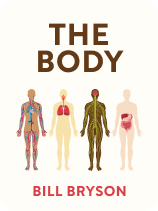

This article is an excerpt from the Shortform book guide to "The Body" by Bill Bryson. Shortform has the world's best summaries and analyses of books you should be reading.
Like this article? Sign up for a free trial here .
Why are we so drawn to high-calorie foods? Is the human body designed to process so many calories?
According to Bill Bryson’s book The Body: A Guide for Occupants, humans are attracted to calorie-dense food due to evolution. However, what was once an evolutionary advantage is now the reason why so many people struggle to maintain a healthy weight.
Here’s why you should reduce your calorie intake and avoid processed foods.
Limit Your Calorie Intake
Bryson explains that, in the West, we face daily temptation to overeat because our bodies adapted to a prehistoric lifestyle that involved different challenges than the ones we face today. Prehistoric humans subsisted by hunting and gathering, which required them to expend a great deal of energy in obtaining their food. As a result, they instinctively gravitated toward the most calorie-dense food they could find and conserved their energy whenever possible.
As Bryson points out, our bodies still retain these instincts. If we consume more food than we need, our bodies store up the surplus as fat reserves to be used later. In a hunting-and-gathering society, these instincts facilitated our survival.
But, according to Bryson, when our ancestors developed agriculture, the abundance and types of food that were available began to change faster than our bodies could adapt. And recent developments like mechanized farming and food processing have only widened the gap. Thus, in modern times, following our instincts puts us at risk of obesity and malnutrition because most of us can access food in almost unlimited quantities without much physical exertion.
Not only is the modern abundance of food unprecedented, but so is its calorie content. Bryson reports that food processing factories add a great deal of sugar even to foods that don’t intuitively seem sweet. For example, spicy horseradish sauce has about the same amount of sugar per unit volume as apple pie. For this reason, it can be hard to reduce calorie intake, even if you’re doing it consciously.
And sugar isn’t all they add—fats and oils are also common ingredients in processed foods. Bryson writes that, at best, these fats impart additional calories that we don’t need. At worst, they poison us, as in the case of trans-saturated fats, commonly known as trans fats. Trans fats don’t occur in nature—scientists created them in a laboratory in the early 1900s as a supposedly healthier alternative to animal fats. They were a common ingredient in many processed foods throughout the twentieth century, despite published research that showed they were toxic as early as the 1950s. In the United States, the use of trans fats in food wasn’t prohibited until 2018.
Furthermore, Bryson points out that it isn’t just processed food that’s unnecessarily high in calories. Even modern fruits and vegetables contain far more sugar than they used to because they have been selectively bred for sweetness over the course of human history.
| Are Our Bodies Designed for Ancient Farming Rather Than Hunting and Gathering? Bryson argues that it’s challenging to eat healthy in modern times because our bodies are still optimized for the hunter-gatherer lifestyle of our ancestors. Others have argued that it’s not our hunter-gatherer background that our bodies crave, but instead, our ancient agrarian roots. In The Omnivore’s Dilemma, Michael Pollan argues that our ancestors developed a healthy diet in ancient agrarian societies (rather than hunter-gatherer societies, as Bryson argues), but that twentieth-century developments in farming and food processing methods disrupted this system. Pollan argues that ancient agriculture was our “natural state” and that it’s modern “mega-farming” methods that have caused us to become maladapted. He places much of the blame on the corn industry, which, in the pursuit of profit, has pushed for cheaply-produced, high-calorie corn products (such as high-fructose corn syrup) to become staple ingredients in food processing factories. The prevalence of these ingredients is one reason processed foods are so fattening. Pollan claims that the natural, pastoral diets of farm-raised animals create healthy meats that are beneficial for our bodies, but that modern mega-farming has resulted in lower-quality meats. The abundant supply of feed corn made it economical for meat producers to raise animals in feedlots or factory farms instead of open pastures. Packing large numbers of animals into a confined space made them more susceptible to disease, so producers began to treat their livestock with antibiotics and other medicines, which contaminate their meat. Additionally, some domestic animals (such as cows and salmon) are forced to eat corn even though it’s not part of their natural diet. This causes even more health problems for the animals, and ultimately for the humans that eat them. Although Pollan doesn’t mention trans fats explicitly, his discussion of corn processing sheds additional light on Bryson’s discussion of it. Trans fats were made predominantly from corn oil and, as such, were less expensive than other ingredients. This gave food processing companies a financial incentive to ignore the scientific evidence on the toxicity of trans fat and continue using it until it was eventually banned. Where Bryson expresses concern that even fruits and vegetables have been selectively bred to contain more sugar than they used to, Pollan says the real danger lies with another byproduct of modern mega-farming: genetic engineering, which has the potential to alter the chemical composition of food plants even more radically. We can’t know all the unintended consequences of genetic changes to food—we might end up with fruit that tastes better but gives you cancer. |

———End of Preview———
Like what you just read? Read the rest of the world's best book summary and analysis of Bill Bryson's "The Body" at Shortform .
Here's what you'll find in our full The Body summary :
- A whirlwind tour of the human body’s various systems
- Why your sense of smell is probably as good as your dog’s
- How hot peppers increase your life expectancy






